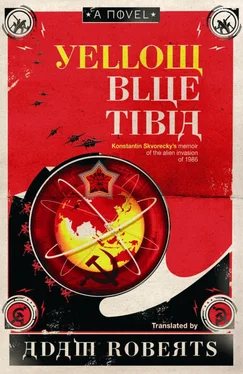‘No fiction was ever shrouded more effectively in unknowing,’ I conceded.
‘Friend, it is starting to come true .’
The late winter sky overhead was all cloud, and had the quality of a vast marble wall reaching up to eternity, flecked with blurry specks of grey and black set in a ground as white as bleach. Moscow was lidded. The row of buildings on the far side of the road seemed crammed close against this wall. The few intervening cars moved sluggishly under its influence.
‘What do you mean?’ I asked, wearily.
‘I mean exactly what I say. The things we plotted. That we buried. The story we wrote. It is starting to come true. In the real world. It’s all coming true.’
‘That doesn’t entirely sound,’ I suggested, ‘possible.’
‘No! You’re right! It’s perfectly impossible! But it’s true , nonetheless. It’s true!’
That’s how I met up with Ivan Frenkel again.
3
I am not trying to trick you. The purpose of this memoir is not trickery, or sleight-of-hand. There are no secrets in this book. I might go so far as to say: the purpose of this book is the very opposite of secrecy — it is drawing your attention to that which is hidden in plain view all the time. I am writing it to record the most profound change in my life; nothing less than a translation from one manner of existence into another, from something grossly physical into something — let us say, spiritual . You might call it ethereal, or radiative, or at the very least other . It all has to do with meeting the alien, and overcoming my cynicism. For I can confess I had fallen into a cynical, an ironic mode of life.
The great change happened in the year 1986, which was in itself a year of many changes. The Soviet Union was changing, with perestroika and glasnost and a number of suchlike words we are proud to have exported to the rest of the world. Then on 9 January — which was a Thursday — the American space-rocket Challenger was launched. I watched it, after the event, on a friend’s television. The news footage was played over and over in Russia: the rocket lifting itself on the blowtorch tail of its own blast. The spacecraft shrinking as the camera followed it up, dwindling to a white dot in the dark blue, shimmying from side to side as the camera juddered slightly on its windblown tripod. Then, without preparation, the axe descending, with its immaterial blade, and cleaving through the whole length of the spacecraft from nose to exhaust and cutting it, with a great puff of magician’s smoke, into two. The footage was silent, but, trained up by cinema, you heard the explosion anyway. One coral-like billow of white cloud suddenly blooming at the end, and two new tendrils of smoking white spiralling away in opposite directions. After that, just the endless hairy meteor-trails of debris coming back down.
No science fiction writer, even a former science fiction writer, could watch that and be unmoved.
To be honest, the mood in the USSR was a curious mix with respect to the Challenger disaster; for we envied the USA and desired to be like her to almost exactly the same degree that we loathed the USA and wished ill to befall her. It was a heart-clenching and rather contradictory occasion, that exploding rocket. Good Russians tried to kindle some national pride from the fact that, the following month, the space station Mir was launched without mishap.
The truth is that our country, having limped through a terrible century, was in a poor way. In that same February the papers were full of the news of the Mikhail Lermontov , a very large ocean vessel that ran foolishly aground near New Zealand. Our whole union was symbolised in that hulk. And what else did 1986 have in store for the USSR? Death throes. The Chernobyl disaster. The collapse of the Soviet system. The rise of the Moscow Mafia. And through it all, me picking out a precarious living interpreting between people who spoke Russian but no English and people who spoke English but no Russian. Turning Ya ne panimayu tibia into ‘[I don’t understand you, and Uspekhov ! into ‘[Here’s to our success!]’
That day, when I chanced upon Ivan Frenkel again in the street, being monitored by his white-hatted official guard, he was enormously keen that we discuss this matter further. Our strange heated science fictional fantasy was coming true! We must talk about it, my friend. It must be talked about!
‘It seems a strange development,’ I noted. ‘And by strange I suppose I mean — impossible.’
Frenkel winked at me.
This is what I deduced: Frenkel presumably worked in some monitoring station — which was a safe guess, of course, since almost all of the business of government is monitoring. His days were filled with inconsequential chatter, overhearing the mild quotidian treacheries and betrayals of Soviet citizens kvetching and complaining. Given his history in the camps he would not be trusted with classified information. Perhaps it gnawed away at him, his unimportance. Perhaps he dwelled on the day when Stalin himself summoned him — him, Ivan Frenkel, science fiction writer! — to do top secret work of the greatest importance. Perhaps, being old, he blurred together that glorious past and this degraded present in some mental construction. Perhaps he interpreted something he overheard, or read, or came across as evidence that the radiation aliens were massing overhead and readying themselves to come down.
Another man might have felt some pity for an old friend, and indulged him. But I am not another man. I only wished him to go away. I had no interest in his fantasies. The question I ponder now, from my present elevated situation is: Had I known then what I now know — that Frenkel was in effect speaking the truth — would I have been so dismissive? It’s always possible, you see, that I would have been.
Frenkel pulled an official-looking notepad from his breast pocket and scribbled an address on it. ‘This is where I’m working now. There are several good places for lunch in the area.’
‘Your workplace is indeed very central.’
‘Write your address on this piece of paper.’
Not wanting to prolong the scene I scribbled something down.
‘Lenin hills?’ said Frenkel, examining what I’d written. ‘That’s a very nice area.’
‘Not bad,’ I said.
‘That’s a very nice part of town indeed ,’ he said, looking me up and down.
I had written down my ex-wife’s address, not mine. I wanted rid of the man, and his peculiar official guard, or monitor, or superior. We embraced, and went our separate ways. I hoped never to see him again. Moreover I can say, as a science fiction writer, that in some alternate reality, some different branching timeline, I never did see him again. You’ll permit me, I hope, the indulgence of pausing here to imagine that eventuality — my consciousness sliding, frictionlessly, from choice to choice, veering left and right at the branching nodes of a billion quantum choices and into a world in which Frenkel and I never met again, and I lived out my life in peaceful, blissful boredom. A world in which I did not endure the sufferings I endured in this timeline. A world in which I didn’t die in Chernobyl.
PART TWO

‘The party proceeds from the Marxist-Leninist proposition: History is made by the People, and Communism is a creation of the People.’
From The Programme of the Communist Party of the Soviet Union, adopted by the 22nd Congress of the Party 1961
Читать дальше













